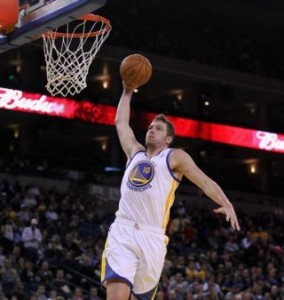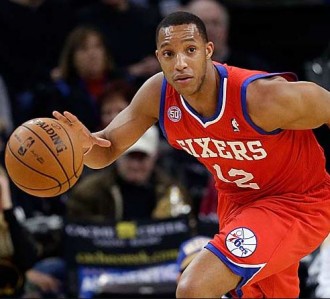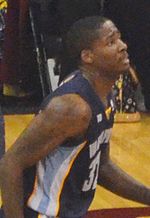 The NBA’s trade deadline is just a week away, and practically every team will be looking to improve its roster or
The NBA’s trade deadline is just a week away, and practically every team will be looking to improve its roster or its payroll over the All-Star break.
its payroll over the All-Star break.
Many of the media reports will come from the perspective of the teams and the executives in charge of making the trades, and few will detail how the players manage, cope and deal with being the subjects of these rumors and reports.
Over the last few weeks, SheridanHoops spoke with nine NBA players on six different teams, from veterans to youngsters, big men and guards, on their interestingly varied experiences.
Washington Wizards forward Drew Gooden has played for 10 teams over his 13-year career. When approached by SheridanHoops for the story, he replied, “You came to the right person.”
Gooden, who’s been traded a whopping six times, explained his maturation process in digesting all the rumors as his career progressed.
“When I was younger, it affected me because I was a key part of certain teams and one of the top players on those teams,” Gooden told SheridanHoops. “And when I was younger, I didn’t know how to handle that. Once I went through the process a couple of times and getting traded a few times, it didn’t affect me anymore as much as the first time I got traded.”
Most of the players agreed that trade rumors proved to be much more difficult when they were younger.
“I think young players, they kind of worry about it a little bit because they’ve never been used to it,” said Boston Celtics forward Tayshaun Prince, who has been traded twice in two years after spedning his first 10-plus seasons with Detroit.
 Golden State Warriors forward David Lee confirmed Prince’s logic.
Golden State Warriors forward David Lee confirmed Prince’s logic.
“When you’re a young player and you hear it, it’s very difficult,” Lee told SheridanHoops. “You get in the league and you assume you’re going to be with the same team for 100 years and you’re never going to leave.”
Obviously, the nature and the business of the league dictates that players spending their entire careers (assuming it’s lengthy) on just one team is now an extreme rarity.
Players interviewed for this story stressed that you can’t focus on or think about rumors too much because there isn’t much a player can do about it.
“It’s a part of the game,” said New Orleans Pelicans forward Ryan Anderson. “You can’t really stress about it. It happens.”
Rumors, whether true or not, are fueled by media reports and a few players justified the prevalence of rumors by saying that they’re good for the sport.
“Sometimes it’s good for basketball, you know? It keeps the media involved,” said Wizards guard Andre Miller. Besides, he said, “nine times out of 10, when it comes out, it’s true.”
“Oftentimes the media’s gotta have something to talk about, so they come up with that stuff,” Lee said.
Shaun Livingston, in his first year as a backup guard with the Warriors, differed from Miller and said that rumors are true about 40 percent of the time.
“I’m sure there’s something happening but a lot of times there’s just smoke behind it,” Livingston told SheridanHoops.
That discrepancy is just a small representation of the uncertainty players go through when they become part of a rumor, whether there’s substance or smoke, as Livingston put it. Many NBA players, it seems, like to be in control. Trade rumors tend to take that control and turn it on its head. A lot of the players interviewed said that they try not to worry about things they can’t control.
“Obviously some players are different than others because they’re going to be reading every news article about themselves. So it kinda stresses them out,” said New York Knicks center Jason Smith.
“It’s nothing you can control, so why deal with it?” Prince asked. “Parents always tell you don’t worry about something you can’t control. If you have that mindset, that stuff doesn’t bother you.”
For Lee, rumors were a constant and consistent part of his career when he was with the Knicks.
“I played in New York for five years where there were rumors to trade the entire team every single season,” Lee said. “The first time, you’re kind of threatened to be out of [your team], thinking you’re going to have to move. Friends and family that are used to watching you in one place have to go to a different place. A lot of factors change when you move, so it’s a little bit intimidating.”
But what if the rumors end up being true, and a player gets traded to a different team? As is human nature, some players deal with it differently than others.
“You were playing your heart out every night in this jersey you’re wearing for that team, that organization, and any given time you can get traded and you have to take that same mentality and that same focus and perform with another team, maybe in the next week or two, ” Gooden said. “That was hard. And leaving teammates and guys you built relationships with, staff members, coaches, trainers, strength and conditioning people, fans. To hear your name in trade rumors and for it to eventually happen, it’s kinda tough.”
 Traded players have to say goodbye to their apartments, favorite restaurants, routines and comfort zones.
Traded players have to say goodbye to their apartments, favorite restaurants, routines and comfort zones.
“The first time was a little rough because I’ve never been traded and I liked where I was at,” said Los Angeles Lakers big man Ed Davis, who went from Toronto to Memphis in the January 2013 three-team Rudy Gay trade that also involved Prince. “It happened overnight for me. It happened when we were on the road, so I never went back to my spot. I sent my family up there to pack up, so that was the most difficult thing for me. I got my bed shipped, but I never went back to that place.”
With the Philadelphia 76ers going through one of the worst seasons in league history last year, everyone knew they were going to trade swingman Evan Turner – including Turner himself.
“Obviously you don’t want to pay attention to them, but after you hear it a lot then you don’t really worry about it,” Turner, now with the Celtics, told SheridanHoops. “Whatever’s going to happen it’ll happen, you know? If I was going to get traded, that’s what was going to happen anyway.”
Eventually, Turner got caught up in the commotion of all the rumors and he wondered where he’d end up himself.
“I kind of saw it coming, so honestly I was kinda caught up in how the movie was going to end myself,” he said. “I kept hearing I was going to go here one day and they couldn’t get the deal done, or I was going there one day and they couldn’t get the deal done. After a while, it’s like whatever happens, there’s so much discussion.”
Turner was planning his postseason vacation when he got a text from his agent that he had been traded to Indiana. After all those months of speculation, it was finally done.
“Once you’ve done it a couple of times, I kinda feel like you get numb from the feeling and it becomes part of the business,” Gooden said.
“Now it’s just part of the business,” Davis said. “I just take it however it comes. If I get traded, then it means a team wants me.”
Ultimately, players agreed with Davis. Whatever is discussed in the media or among team executives, it’s all part of being a
professional player.
“It’s something that we’ve all gotta deal with, try to keep out of our heads as much as possible not to make a distraction,” Miller said.
Several more players will likely dealt before next week’s deadline, and a good amount of them have probably been traded once or twice before as rosters constantly churn and turn over.
“Once you get older and you see everybody you came in with has been traded two or three times, you kind of realize that it’s just part of the game,” Lee said.
“It’s a part of your career and your job,” Anderson said. “You just have to be ready.”
Shlomo Sprung is a national columnist for SheridanHoops who focuses on analytics, profiles and features. He is also the web editor of the Brooklyn Daily Eagle. A 2011 graduate of Columbia University’s Journalism School, he has previously worked for the New York Knicks, The Sporting News, Business Insider and other publications. You should follow him on Twitter.